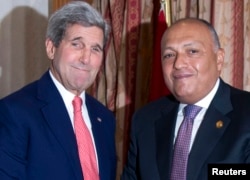U.S. Secretary of State John Kerry met here Monday with Egyptian President Abdel Fatah al-Sisi to discuss the Israeli-Palestinian conflict and the fight against Islamic State militants.
But as Cairo tries to broker a more lasting peace between Hamas and Israel, Kerry and other U.S. officials say Egypt’s leaders must also meet the needs of their own people. The Americans urge easing restrictions on Egyptian civil society and its transition to democracy.
Kerry said he and Egypt’s foreign minister, Sameh Shoukry, "discussed, as we almost always have, the essential role of a vibrant civil society, a free press, due process under law. And there’s no question that Egyptian society always has been stronger, and is stronger, when all of its citizens have a say and a stake in its success.”
Egypt’s protest law allows authorities to ban any public gathering of more than 10 people. It is one of the measures blocking the full restoration of U.S. financial assistance to the new government, which continues to detain journalists and many members of the former ruling party, including Egypt's ousted president.
Promise of reform
Abdel Fattah al-Sisi, Egypt’s former military chief, led the coup that toppled Egypt’s first democratically elected leader, Mohammed Morsi, in July 2013. Voters chose al-Sisi as president in June.
Last month, al-Sisi told the United Nations General Assembly he is committed to reform: "Our aim is to build a new Egypt – a state that represents the rights and freedoms, honors its duties and ensures the co-existence of its citizens without exclusion or discrimination, a state that respects and enforces the rule of law and guarantees freedom of opinion."
Yet some say al-Sisi must do more to show he is serious about those reforms.
"General al-Sisi has to very quickly establish himself as a wise, sensible leader if he has to gain any credibility in the near future," said Akbar Ahmed, an international studies professor at American University in Washington. "… Otherwise, he will have to be constantly battling this reputation of having come in as a military dictator at a time when it seemed, after the Arab Spring, that the time of the military dictators was over."
Concern over silenced critics
Many members of the former ruling Muslim Brotherhood remain behind bars, as do other critics of the al-Sisi administration.
Human rights lawyer and former presidential candidate Khaled Aly accused al-Sisi of misusing the law.
"For example, people took to the streets to show support for Sisi," he said. "Others took to the streets against Sisi. Those who were supporting Sisi were protected by the police and could not be touched while those who were protesting against him were arrested."
Egypt continues to play important roles in resolving the Israeli-Palestinian conflict and fighting Islamic State militants.
But Washington cannot let that obscure the push for civil liberties, said Sarah Margon, Washington director for the advocacy group Human Rights Watch.
"Down the line, having human rights, basic fundamental freedoms, expression, association, assembly – those are all integral to national security," she said.
"And if you look only short term, you're much more likely to cloud the longer-term prospects for peace."






